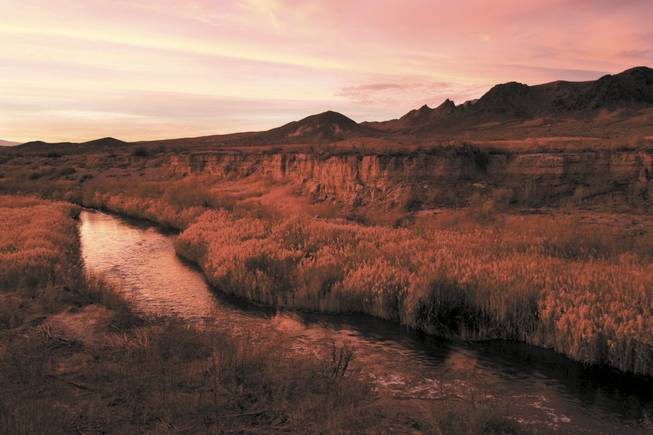
At one time, the Clean Water Coalition had planned a pipeline that would have crossed this stretch of the Las Vegas Wash to expel treated wastewater into the deeper depths of greater Lake Mead. However, the CWC mothballed that project and the Nevada Legislature took $62 million allocated for it.
Wednesday, Sept. 21, 2011 | 12:45 p.m.
Sun Archives
- Court rules Legislature’s $62 million grab unconstitutional (5-26-11)
- Pipeline plan died, so where do the fees go? (3-9-11)
- Clean Water Coalition will sue state to keep $62 million targeted by lawmakers (3-11-2010)
- Clean Water Coalition balks at localities’ request to return cash (1-10-2010)
- Las Vegas to pull out of Clean Water Coalition (9-15-2010)
- State: Reno wrong to support Southern Nevada in $62M battle (5-27-10)
- State: Reno wrong to support Southern Nevada in $62M battle (5-27-10)
- Reno sides with Southern Nevada in Legislature battle (5-24-10)
- Governor, Legislature seek to keep $62 million for state budget (3-18-10)
- Gibbons signs budget bill; state draws M Resort lawsuit (3-12-10)
- Clean Water Coalition will sue state to keep $62 million targeted by lawmakers (3-11-10)
- Will a gamer sue the state over part of special session budget plan? (3-2-10)
Try to give the pipeline money back to the property owners — or former property owners — who paid it. And keep the money out of the hands of the banks who might have foreclosed on those properties.
Those were the two directives that the Las Vegas City Council gave today to city staff in trying to determine how to return a windfall of about $7.25 million that was supposed to go to help pay for a mothballed Lake Mead pipeline project.
“I am not in favor of giving banks a dime,” Las Vegas City Councilman Steve Ross told his fellow council members. Several of them expressed similar sentiments, including Mayor Carolyn Goodman and Councilman Bob Coffin.
Ross said there’s got to be a way to identify homeowners, homebuilders and developers who paid those fees so they can get the refunds.
“These builders and developers can certainly use this money right now and reinvest it back into this community,” Ross said. “There’s got to be some way to do this better than the way the county’s doing it.”
The refunds are coming from the Clean Water Coalition, which was created in 2002 to build a $860 million pipeline designed to funnel treated wastewater deep into Lake Mead. The purpose was to better dilute the water rather than letting it drain into the shallow Las Vegas Bay, an inlet of Lake Mead. Original CWC members were the Clark County Reclamation District and the cities of Las Vegas and Henderson. North Las Vegas joined the CWC in 2006. However, the CWC voted to mothball the pipepline project in December 2009 because wastewater treatment technology had improved so drastically that the pipeline was no longer needed.
Nevada lawmakers, needing funds, raided the CWC of the $62 million that was to have gone for the pipeline. However, last May, the Nevada Supreme Court ruled the money had to be returned to the CWC.
The CWC decided at its Sept. 8 meeting to return the funds to its member entities. Las Vegas has been given back $16.1 million in its share.
During action today, the Las Vegas council unanimously decided today to put 55 percent of that $16.1 million in refunds, or about $8.85 million, into the city’s Sanitation Sewer Enterprise fund.
At issue is how to fairly return the remaining $7.25 million, which was paid by property owners in fees for hookups. After some discussion, Councilman Steve Wolfson suggested and the council unanimously approved directing its staff to come back with several more options at the council’s Oct. 19 meeting.
Jorge Cervantes, director of public works, said one of the options, which he said was the cleanest, was to give a credit to those with active sewer user accounts, which would be, on average, about a 9 percent reduction for property owners. That works out to about $20 for each homeowner, according to city staff.
However, Councilman Ross opposed that suggestion.
Ross said that because of recent foreclosures on many properties in Las Vegas, those who actually paid the fees, including home builders and developers, wouldn’t get their money back. Ross said he wanted some way to get those refunds to those who actually paid into the fund — and not provide a boon to the buyer of a foreclosed property.
Cervantes said it would be difficult to go back and track down the people who actually paid the sewer fees. But several of the council members suggested there must be a way to find those former property owners.
Coffin, a former state senator who was elected to the council in the spring, said when the Legislature tried unsuccessfully to lay claim to the money in 2010, they were told the money was paid in by the casinos and “the big boys.” However, Coffin said he was uneasy about taking that money and was the lone senator to vote against taking it from the CWC.
Coffin said at that time, when he was looking into the matter, he learned that many small business owners also paid thousands of dollars in fees for the CWC’s pipeline project. For example, a local pizza restaurant owner told him that to put in a couple of sinks and a toilet during a remodel, he had to pay $2,000 in fees.
“There were stories like this all over the place,” Coffin said.
Coffin said lawmakers were shown a thick computerized list of people who had paid into the fund over the years, including churches, unions and schools. He said lawmakers, who acted in haste, voted anyway to take that money. But the Supreme Court ruled they had to return it back to the CWC.
“I made a vow at that point that we were definitely going to return the money to the people who paid it,” Coffin said. “. . . You can identify every one of those souls. It just takes a little time. They’re all on a list.”
Goodman suggested that if they city can't find all those who paid, they still might be able to eliminate the portion of the fees that might go to banks that have foreclosed on properties.
“The intent is to see that it goes to the right people,” she said.


Join the Discussion:
Check this out for a full explanation of our conversion to the LiveFyre commenting system and instructions on how to sign up for an account.
Full comments policy